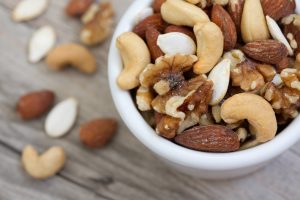 You may have heard that breakfast is the most important meal of the day. However, is this really true or just an old wives’ tale? Recent research does show that a high-quality breakfast can improve health-related quality of life. However along with this finding, a new study shows that eating this meal could lower your heart disease risk. Let’s learn a little more about the importance of your morning meal for overall health and how you can make it healthier.
You may have heard that breakfast is the most important meal of the day. However, is this really true or just an old wives’ tale? Recent research does show that a high-quality breakfast can improve health-related quality of life. However along with this finding, a new study shows that eating this meal could lower your heart disease risk. Let’s learn a little more about the importance of your morning meal for overall health and how you can make it healthier.
Breakfast and quality of life
In a study of adolescents, those who consumed a poor quality breakfast had higher levels of stress and depression than those who skipped or had a high quality morning meal. Those who consumed a high quality breakfast had the lowest levels of stress and depression. Therefore, it’s not just about whether you eat breakfast or not, but if you eat a high quality meal.
Another study looked more closely at the quality of breakfast that can bring about health benefits. This study found that a high-quality morning meal will be balanced with protein, fiber, and vitamins and nutrients like vitamins A, C, and D as well as calcium and iron.
Breakfast and heart health
Not only may breakfast improve quality of life, but it could also extend your life. This is because a recent study found that eating breakfast could lower your risk of heart disease. This study looked at a sample of health data from over 6000 adults aged 40 to 75 years old over 17 to 23 years. Study results show that skipping your morning meal was linked with an increased risk of death from heart disease.
As previous studies have found though, this doesn’t mean that eating doughnuts and pastries with sugary coffee drinks each morning is healthy. Therefore, to make the most of your morning meal and have it benefit health, make it balanced.
How to create a healthy breakfast
Breakfast is not just good for heart health and mental health, but can also lower risk of chronic disease like diabetes. Because of its many potential health benefits, be sure to make your morning meal its best by using the following tips.
- Start with a healthy protein. Cook up a few eggs, turkey bacon, and/or low sodium Canadian bacon for heart healthy proteins. And if you follow a meatless diet, then enjoy scrambled soft tofu with or without some black beans. Another meatless breakfast option is protein-rich Greek yogurt or oatmeal with chopped walnuts.
- Add in gut-friendly fiber. Once you’ve chosen your protein base, add in some antioxidant and fiber-rich foods like fruits and vegetables. Throw some spinach in your omelette or top your oatmeal or yogurt with berries or sliced apples. Other ideas include blending your yogurt with fruit for a drinkable balanced breakfast or sprinkling some chia seeds on your oatmeal, yogurt, or avocado toast.
- Don’t forget healthy fats. Sliced avocado with eggs or spread on toast, or using olive oil to cook your eggs can add healthy fats to your morning meal. Other healthy fats you can add include nuts, seeds, and salmon (like smoked salmon on toast or a whole grain bagel).
- Limit sugar intake. It can be tempting to enjoy a doughnut on the way to work or from the break room. Also, it can be just as easy to grab a whipped cream topped coffee drink to start your day. However, a sugary start can lead to unhealthy eating habits throughout the day. Therefore, stick to low sugar options. If you crave sugar in the morning, try instead a Greek yogurt with a drizzle of honey or a delicious low sugar protein shake flavored with peanut butter, vanilla, or cocoa to help satisfy your sweet tooth.
- Don’t drink your calories. Instead of sugary coffee drinks, stick to sugar-free options like coffee with sugar-free creamer and/or sweetener. Other low-calorie breakfast drinks include hot or iced tea with low-calorie sweetener, lemon or cucumber-infused water, unsweetened almond milk, or just plain water.
And just to be sure you consume your daily dose of nutrients, a supplement for heart health may also help. Circova by Vita Sciences contains natural ingredients like niacin, L-arginine, and hawthorne to help improve blood flow and blood pressure. Improvements like these can help lower heart health risk, along with a healthy diet of course.
 When you first wake up in the money, it may be easy to grab something quick like a donut, pastry, or a quick bowl of cereal. However, what you choose to eat for breakfast could very well set the tone for what you eat the rest of the day. In fact, research shows that if you reduce carbohydrate intake at breakfast, then you could help control your blood glucose levels. Let’s learn a little more about this study, about blood glucose levels, as well as ways you can reduce carbs at your next morning meal.
When you first wake up in the money, it may be easy to grab something quick like a donut, pastry, or a quick bowl of cereal. However, what you choose to eat for breakfast could very well set the tone for what you eat the rest of the day. In fact, research shows that if you reduce carbohydrate intake at breakfast, then you could help control your blood glucose levels. Let’s learn a little more about this study, about blood glucose levels, as well as ways you can reduce carbs at your next morning meal. When it comes to eating healthy, your primary concern may be the short-term goal of losing weight. You may want to fit into a certain piece of clothing, or be in better shape for an upcoming event. However, it’s important not to forget that eating healthy can ultimately help you to extend your life. A recent report reveals that one in five deaths globally was linked to a poor diet.
When it comes to eating healthy, your primary concern may be the short-term goal of losing weight. You may want to fit into a certain piece of clothing, or be in better shape for an upcoming event. However, it’s important not to forget that eating healthy can ultimately help you to extend your life. A recent report reveals that one in five deaths globally was linked to a poor diet.